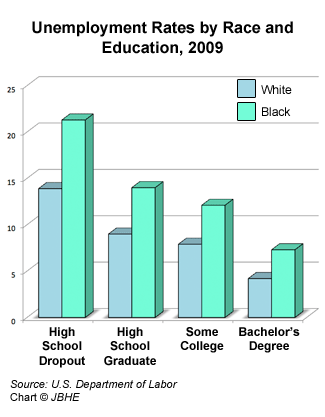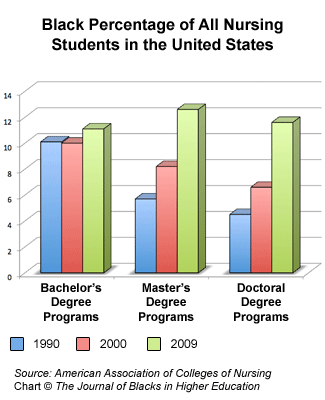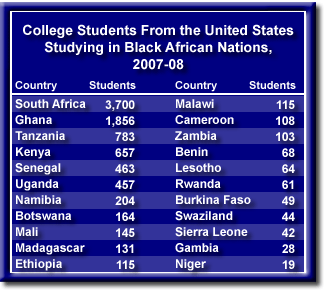House Piggybacks New Student Loan Program on Healthcare Reform Package: Pell Grant Program for Low-Income Students Gets an Additional $36 Billion
In conjunction with the passage of major healthcare reform, the House of Representatives passed legislation revamping the federal student loan program. Under the bill the Federal Family Education Loan program would be eliminated. This program provides federally guaranteed loans through private financial institutions. Under the new program, loans would be made to students directly by the federal government. By cutting out the middle man, the program is projected to save $61 billion over the next decade.

The legislation provides that $36 billion of the savings be directed to shore up the Pell Grant program, which provides grant money for college to millions of low-income students. The maximum Pell Grant award would increase to $5,900 over the next decade. Currently the maximum grant is $5,500.
A College Education Does Nothing to Close the Racial Unemployment Gap
In 2009 the nation’s unemployment rate rose to an annual average of 9.3 percent. This was up from 5.8 percent in 2008. But as the old saying goes, when the American economy catches a cold, black Americans get a fever. For blacks, the unemployment rate rose from 10 percent in 2008 to 14.8 percent in 2009. Nearly 18 percent of black men were unemployed. For black teenagers, the unemployment rate was just under 40 percent.
At all levels of education the racial gap in unemployment rates persists, but a college education, as expected, still does wonders in lowering the overall unemployment rate for African Americans. In 2009 African-American high school graduates had an unemployment rate of 14 percent. For African-American four-year college graduates, the unemployment rate of 7.3 percent is about half the rate for black high school graduates.

A college degree is an important force in lowering the overall unemployment rate for blacks. But it does not come close to eliminating the racial gap in unemployment rates. When we break down the unemployment figures by educational attainment, the ratio of black unemployment to white unemployment is actually higher for college graduates than it is for blacks and whites with lower levels of education. Blacks who dropped out of high school are 1.5 times as likely to be unemployed as similarly educated whites. Blacks who are high school graduates are 1.6 times as likely to be unemployed as whites with the same level of education. For college graduates, blacks are more than 1.7 times as likely to be unemployed as similarly educated whites.

NATIONAL WAR COLLEGE

Assistant/Associate/Professor of National Security Studies, U.S. Foreign Policy
The National War College in Washington, D.C., is seeking a scholar in national security studies with a strong knowledge of U.S. foreign policy, and who may have a specialization in a specific region or a relevant functional issue such as foreign aid, international organizations, coercive diplomacy or strategic communications.
For more information you can go to http://www.usajobs.gov or contact Ms. Jessica McDaniels at 202-685-2130 about Job Announcement Number NDU-57-10.

UCLA Study Finds Blacks Are Vastly Underrepresented in California Higher Education
 A new study by researchers at the Ralph J. Bunche Center for African American Studies at the University of California at Los Angeles presents evidence that African Americans remain grossly underrepresented in the state’s higher education system. Among the findings of the study: A new study by researchers at the Ralph J. Bunche Center for African American Studies at the University of California at Los Angeles presents evidence that African Americans remain grossly underrepresented in the state’s higher education system. Among the findings of the study:
• The underrepresentation of blacks in higher education in California is a result of historic, systemic, and persistent racial inequalities in the state’s K-12 educational system.
• The state’s system of higher education is largely segregated by race.
• Proposition 209, which bans the consideration of race in college admissions, has had a disproportionate negative impact on African Americans.
• The current state budget crisis is disproportionately impacting African-American opportunities in higher education in California.
 Walter Allen, Allan Murray Cartter Professor of Higher Education at UCLA and coauthor of the report, warns, “The diminished, declining opportunities for blacks and other underrepresented students of color in California higher education threaten the state’s economic, democratic and cultural vibrancy. Failure to offer equitable opportunities not only places African Americans at risk, it risks America’s future.” Walter Allen, Allan Murray Cartter Professor of Higher Education at UCLA and coauthor of the report, warns, “The diminished, declining opportunities for blacks and other underrepresented students of color in California higher education threaten the state’s economic, democratic and cultural vibrancy. Failure to offer equitable opportunities not only places African Americans at risk, it risks America’s future.”
The report — Till Victory Is Won: The African-American Struggle for Higher Education in California — can be downloaded by clicking here.
Study Finds That Black Freshmen in Science Fields Are More Likely to Earn Degrees in These Disciplines If They Had a Black Instructor
 A new study from the Higher Education Research Institute at Cornell University finds that African-American college students who plan to pursue majors in mathematics or science are more likely to persist in these fields if they had a black instructor during their freshman year. A new study from the Higher Education Research Institute at Cornell University finds that African-American college students who plan to pursue majors in mathematics or science are more likely to persist in these fields if they had a black instructor during their freshman year.
The study examined 157,000 freshman students at 13 four-year universities in Ohio who planned to major in science or mathematics. Those black students in these fields who had a black instructor were found to have a higher rate of persistence than black freshmen whose instructors were whites or other nonblacks. The research did not find a similar correlation for women who had a female instructor.
In Memoriam
Ruth Mitchell Laws (1912-2010)
 Ruth Mitchell Laws, the first woman in the United States to earn a doctorate in administration and supervision, died recently in Dover, Delaware. She was 97 years old. Ruth Mitchell Laws, the first woman in the United States to earn a doctorate in administration and supervision, died recently in Dover, Delaware. She was 97 years old.
Dr. Laws was a graduate of Hampton University. She held a master’s degree from Cornell University and a doctorate from New York University. She chaired the department of home economics at Delaware State University and later was vice president for research and development at Delaware Technical and Community College.
Dr. Laws was the first African-American woman to hold a professional position in the Delaware Department of Education.
Emmanuel I. Osagie (1952-2010)
 Emmanuel I. Osagie, chancellor of the Fayette campus of Pennsylvania State University, died from complications of an illness at a hospital in Uniontown. He was 58 years old. Emmanuel I. Osagie, chancellor of the Fayette campus of Pennsylvania State University, died from complications of an illness at a hospital in Uniontown. He was 58 years old.
A native of Nigeria, Dr. Osagie had been chancellor at the Fayette campus for the past three years. He was a graduate of Southern University and held master’s and Ph.D. degrees in agricultural economics from Louisiana State University. Prior to coming to Penn State, he was an administrator at Southern University and The College of New Jersey.
  |
37.4% Percentage of all college freshmen in 2009 who believed that affirmative action in college admissions should be continued.
55.4% Percentage of all freshmen at historically black colleges and universities in 2009 who believed that affirmative action in college admissions should be continued.
source: Higher Education Research Institute, the University of California at Los Angeles
|
Honors and Awards
 • Camilla Williams, renowned opera soprano and professor of voice at the Indiana University Jacobs School of Music from 1977 to 1997, was presented with the Sagamore of the Wabash award, the highest honor bestowed by the governor of Indiana. • Camilla Williams, renowned opera soprano and professor of voice at the Indiana University Jacobs School of Music from 1977 to 1997, was presented with the Sagamore of the Wabash award, the highest honor bestowed by the governor of Indiana.
 • Carolyn Collins, the first African-American dean of an academic college at Louisiana State University who retired in June 2009, will have a scholarship fund named in her honor at the university. Each year the Carolyn Collins Scholarship will be awarded to a freshman or sophomore who has shown a dedication to community service. • Carolyn Collins, the first African-American dean of an academic college at Louisiana State University who retired in June 2009, will have a scholarship fund named in her honor at the university. Each year the Carolyn Collins Scholarship will be awarded to a freshman or sophomore who has shown a dedication to community service.
 • Michelle R. Howard-Vital, president of Cheyney University of Pennsylvania, was given the Mary McLeod Bethune Award from the organization Women Cultivating Women. President Howard-Vital was honored for her lifelong work as an educator. • Michelle R. Howard-Vital, president of Cheyney University of Pennsylvania, was given the Mary McLeod Bethune Award from the organization Women Cultivating Women. President Howard-Vital was honored for her lifelong work as an educator.
• Cyprian Davis, professor of church history at Saint Meinrad Seminary in Indiana, received the Acacia Award by the Office of Multicultural Ministry of the Archdiocese of Louisville. He is the author of The History of Black Catholics in the United States.
 • James Lee III, associate professor of fine and performing arts at Morgan State University, won the Wladimir and Rhoda Lakond Award from the Academy of Arts and Letters. The award, which comes with a $10,000 cash prize, is given to a promising, mid-career composer. • James Lee III, associate professor of fine and performing arts at Morgan State University, won the Wladimir and Rhoda Lakond Award from the Academy of Arts and Letters. The award, which comes with a $10,000 cash prize, is given to a promising, mid-career composer.
Dr. Lee holds bachelor’s, master’s, and doctoral degrees from the University of Michigan.

|
A Healthy Increase in the Number of Blacks in Academic Nursing
In 1990 there were 8,745 African Americans enrolled in bachelor’s degree programs in nursing in the United States. They made up 10.1 percent of all nursing students in the nation that year. In 2009 the number of blacks in bachelor’s degree programs in nursing reached a total of 15,453. This is an increase of 77 percent over the past two decades. In 2009 blacks were 11.1 percent of all nursing school students.
The progress has been even more spectacular at the graduate level. In 1990 there were 1,197 blacks enrolled in master’s degree programs in nursing in the United States. They made up 5.7 percent of all students in master’s degree programs in nursing. By 2009 the number of blacks in these graduate nursing programs had increased more than sevenfold to 8,479. Blacks now make up 12.6 percent of all students in master’s degree programs in nursing.

Blacks in doctoral programs in nursing have also made tremendous progress since 1990. That year there were 109 black students pursuing a doctorate in nursing. They made up 4.5 percent of all students enrolled in doctoral programs in the field. By 2009 the number of blacks in nursing doctoral programs had nearly quadrupled to 424. Today, blacks are 11.6 percent of all students enrolled in doctoral programs in nursing. Blacks in doctoral programs in nursing are particularly important as these students tend to go on to careers in academic nursing where they will teach and become role models for young African-American students in the field.
  |
 “We love you. We just want some love back.” “We love you. We just want some love back.”
— Michael Eric Dyson, University Professor of Sociology at Georgetown University, speaking at Chicago State University on March 20, 2010, voicing concern that President Obama is not doing enough for the black community
|
American College Students in Africa
New data from the Institute of International Education finds that more than 262,000 American students studied at foreign institutions of higher education during the 2007-08 academic year. This was up 8.5 percent from a year earlier. A vast majority of Americans studying abroad (56.3 percent) attended universities in Europe. Of all U.S. students studying abroad, 11,844, or 4.5 percent, attended universities in Africa. The number of American students studying in Africa has doubled since 2004. Africa sends more than three times as many students to American universities as America sends to African universities.
Among black African nations, South Africa was the most popular destination. In 2007-08, 3,700 American students studied in South Africa, more than double the number in 2003. Ghana hosted 1,856 American students in the 2007-08 academic year. Kenya, Tanzania, Senegal, Botswana, Namibia, Zambia, Ethiopia, Mali, Madagascar, Malawi, Cameroon, and Uganda were the only other black African nations hosting more than 100 American college students.
Of the 262,416 American students studying abroad in all areas of the globe, 4 percent were African Americans.

Two Black Scholars at Brown University Awarded 2010 Salomon Faculty Research Awards
Each year Brown University offers cash awards to faculty members involved in research projects of exceptional merit. This year two of the winners are African Americans.
 Carthene Bazemore-Walker, assistant professor of chemistry, will receive a cash award to foster her research into the bonding agents of marine bacteria. Carthene Bazemore-Walker, assistant professor of chemistry, will receive a cash award to foster her research into the bonding agents of marine bacteria.
 Francoise N. Hamlin, an assistant professor of history and Africana studies, will use her research grant to study children who came of age during the civil rights movement. Her research is concentrating on children who were subjected to some form of trauma as a direct result of civil rights activities. Francoise N. Hamlin, an assistant professor of history and Africana studies, will use her research grant to study children who came of age during the civil rights movement. Her research is concentrating on children who were subjected to some form of trauma as a direct result of civil rights activities.
A Mega-Scholarship Will Cover College and Medical School Costs for a Minority Student at a Cleveland High School Each Year
 The Joan C. Edwards Charitable Foundation has endowed a scholarship fund that will provide full tuition and room and board for college and for medical school at Case Western Reserve University to a minority student who graduates from the Cleveland School of Science and Medicine. The specialty high school is part of the public school system in Cleveland. Over the course of college and medical school, the scholarship will be worth more than $450,000. The scholarship was created for an inner-city student in the hope that after graduating from medical school in that city, the recipient will stay and practice medicine in underserved minority communities. However, there is no stipulation in the scholarship rules that the student remain in Cleveland after graduating from medical school. The Joan C. Edwards Charitable Foundation has endowed a scholarship fund that will provide full tuition and room and board for college and for medical school at Case Western Reserve University to a minority student who graduates from the Cleveland School of Science and Medicine. The specialty high school is part of the public school system in Cleveland. Over the course of college and medical school, the scholarship will be worth more than $450,000. The scholarship was created for an inner-city student in the hope that after graduating from medical school in that city, the recipient will stay and practice medicine in underserved minority communities. However, there is no stipulation in the scholarship rules that the student remain in Cleveland after graduating from medical school.
Joan C. Edwards was a philanthropist and former jazz singer. Her husband, James, who died in 1991, was owner and CEO of the National Mattress Company in Huntington, West Virginia.
New Book Suggests Educated Black Women Consider Interracial Dating
Census data shows that in many urban areas the number of black single women with a college degree is triple the number of black single men with a similar level of education. As a result, black women have an extremely difficult time finding a black partner with a similar educational background.
 A new book by Karyn Langhorne Folan urges educated black women to branch out and consider dating men of other races. “Black women are in market failure,” she writes. “The solution is to find a new market for your commodity. And in this case, we are the commodity and the new market is men of other races.” A new book by Karyn Langhorne Folan urges educated black women to branch out and consider dating men of other races. “Black women are in market failure,” she writes. “The solution is to find a new market for your commodity. And in this case, we are the commodity and the new market is men of other races.”
The book, entitled Don’t Bring Home a White Boy: And Other Notions That Keep Black Women From Dating Out, does not contend there aren’t any educated black men available for marriage, just that there are not enough of them. She urges black women to consider alternatives. “Stop blaming every white man for sins perpetrated by others. Some men, whatever their race, are bad for us. Some men, whatever their race, are good for us.”
Appointments, Promotions, and Resignations
 • Jeffrey S. Lowe was appointed associate director of the Mid-Sized Cities Policy Research Institute at the University of Memphis. Dr. Lowe was also named a visiting associate professor at the university. • Jeffrey S. Lowe was appointed associate director of the Mid-Sized Cities Policy Research Institute at the University of Memphis. Dr. Lowe was also named a visiting associate professor at the university.
Dr. Lowe is a graduate of Howard University. He holds a master’s degree from Morgan State University and a Ph.D. in urban planning and policy development from Rutgers University.
 • Lucille Maugé was promoted to vice president for business and finance at Clark Atlanta University. Since 2006 she has been the chief compliance officer at the university. • Lucille Maugé was promoted to vice president for business and finance at Clark Atlanta University. Since 2006 she has been the chief compliance officer at the university.
A graduate of Southern University, Maugé holds an MBA from Babson College.
 • Eve J. Higginbotham, senior vice president and executive dean for health services at Howard University, was appointed to a four-year term as a member of the National Board of Medical Examiners. • Eve J. Higginbotham, senior vice president and executive dean for health services at Howard University, was appointed to a four-year term as a member of the National Board of Medical Examiners.
 • William R. Harvey, president of Hampton University in Virginia, was named by President Obama as chair of the President’s Board of Advisors on Historically Black Colleges and Universities. • William R. Harvey, president of Hampton University in Virginia, was named by President Obama as chair of the President’s Board of Advisors on Historically Black Colleges and Universities.
 • Mona Newsome Wicks, professor and associate dean for research at the College of Nursing of the University of Tennessee, was named to the Health Disparities and Equity Promotion study section of the National Institutes of Health. The panel reviews grant requests for research into eliminating racial disparities in healthcare. • Mona Newsome Wicks, professor and associate dean for research at the College of Nursing of the University of Tennessee, was named to the Health Disparities and Equity Promotion study section of the National Institutes of Health. The panel reviews grant requests for research into eliminating racial disparities in healthcare.
• James H. Johnson Jr. was appointed chair of the National Advisory Council for Environmental Policy and Technology at the Environmental Protection Agency. Dr. Johnson is professor emeritus of civil engineering and former dean of the College of Engineering, Architecture, and Computer Sciences at Howard University.
Dr. Johnson is a graduate of Howard University. He holds a master’s degree from the University of Illinois and a Ph.D. from the University of Delaware.
 • Melody C. Pierce was named vice chancellor for student affairs at North Carolina A&T State University in Greensboro. She will assume her new position this summer. Currently, Dr. Pierce is vice chancellor for student affairs at Winston-Salem State University. • Melody C. Pierce was named vice chancellor for student affairs at North Carolina A&T State University in Greensboro. She will assume her new position this summer. Currently, Dr. Pierce is vice chancellor for student affairs at Winston-Salem State University.
Pierce holds bachelor’s and master’s degrees from Southern Illinois University and a doctorate in university administration from Michigan State University.
 • Hosetta Belcher Coleman, a senior vice president for Fifth Third Bank, was appointed to the board of directors of the Florida A&M University Foundation. • Hosetta Belcher Coleman, a senior vice president for Fifth Third Bank, was appointed to the board of directors of the Florida A&M University Foundation.
Coleman is a graduate of Tuskegee University and holds an MBA from the University of Phoenix.
Grants and Gifts
• Johns Hopkins University School of Medicine received a five-year, $9.7 million grant from the National Institutes of Health to create a research center aimed at reducing hypertension among African Americans.
 The research will be under the direction of Professor Lisa A. Cooper. Dr. Cooper is a graduate of Emory University and the University of North Carolina medical school. She also holds a master’s degree in public health from Johns Hopkins University. The research will be under the direction of Professor Lisa A. Cooper. Dr. Cooper is a graduate of Emory University and the University of North Carolina medical school. She also holds a master’s degree in public health from Johns Hopkins University.
• South Carolina State University, the historically black educational institution in Orangeburg, received a $100,000 donation from Shaw/AREVA MOX Services to help fund the university’s Nuclear Science Institute. The company is building a new nuclear fuel fabrication plant near Aiken and will need nuclear engineers to staff the plant. • The Gloucester Institute in Richmond, Virginia, received a $300,000 grant from the Verizon Foundation for its Emerging Leaders Program. In conjunction with Virginia’s historically black colleges and universities, the institute conducts training sessions and holds conferences and retreats designed to influence the marketplace of social, economic, and political ideas in the African-American community. |
 .
.